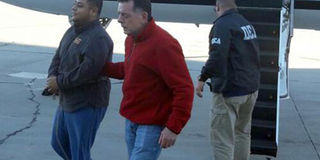Akashas case drags on as boredom settles in their cells

Ibrahim Akasha being escorted to a court in New York on January 31, 2017 by an officer. He is being held in the Metropolitan Correctional Centre in Manhattan. PHOTO | NATION MEDIA GROUP
What you need to know:
- Accused individuals kept in federal detention facilities are also allowed to make phone calls and send emails.
- The four defendants have been charged with conspiring to transport 98 kilogrammes of heroin into the United States from Kenya.
The Akasha brothers and two other alleged members of a Kenya-based drug-smuggling ring are being held in New York under conditions that defence attorneys describe as tolerable.
Ibrahim Akasha, a 28-year-old Kenyan, and co-defendant Vijaygiri Goswami, a 55 year-old Indian, are housed in the Metropolitan Correctional Centre in Manhattan — the same facility where Mexican drug lord Joaquin “El Chapo” Guzman is detained while awaiting trial.
El Chapo, who twice escaped from Mexican prisons, is confined in a “special housing unit” inside the correctional centre.
He and the few other inmates in this unit are kept in their cells 23 hours a day and prohibited from communicating with one another.
Mr Akasha and Mr Goswami have not been placed in this ultra-high-security section of the 12-story building.
Neither they nor the other two defendants in the Kenya drug case — Gulam Hussein, 61, and Baktash Akasha, 40 — are considered especially dangerous.
Daniel Arshack, an attorney for Mr Goswami, said on Friday that his client is permitted to watch television and use the correctional centre's library.
Family members can visit detainees, but Mr Arshack said he does not know if any of Mr Goswami's relatives have traveled to New York to see him.
Accused individuals kept in federal detention facilities are also allowed to make phone calls and send emails, although they must pay to use both forms of communication, Mr Arshak noted.
Attorneys or family members typically put small amounts of money into detainees' accounts that can be used to make these payments and to buy items from a jail commissary.
“He's feeling good about getting positive results in this case,” Mr Arshack said of Mr Goswami.
BOREDOM
Ibrahim Akasha's attorney, Dawn Marcella Cardi, did not return messages asking for comment on her client's health and living conditions.
Mr Hussein, a Pakistani national, and Baktash Akasha, a Kenyan, are confined in the Metropolitan Detention Centre in the New York City borough of Brooklyn.
Conditions there are “not pleasant, not inhumane,” said Jeffrey Pittell, who is representing Baktash Akasha.
Mr Hussein's attorney, Phillip Weinstein, offered a similar comment in regard to the same facility.
“Being locked up is never a pleasant experience,” Mr Weinstein said, but added that conditions in that federal facility are better than those in jails run by the individual US states.
Boredom is the biggest problem experienced by many of the detainees he has represented, Mr Pittell said.
“They want to take classes, but the opportunities are very limited,” he noted.
“There also aren't enough jobs to go around. Detainees want to work and attend classes because that helps pass the time.”
Mr Hussein “is doing OK”, Mr Weinstein said, despite “medical issues”.
Mr Hussein has diabetes, which is treated with daily doses of insulin.
Because his client cannot speak English, he has “limited social contacts,” Mr Weinstein said.
Neither of the attorneys for the two defendants held in Brooklyn are aware, they said, of family visits to their clients.
SLOW ACTIVITY
Mr Pittell noted, however, that he has spoken by phone with Baktash Akasha's wife, who, the lawyer recounted, “sounded concerned and said she misses her husband and that their children are very upset”.
The four defendants have been charged with conspiring to transport 98 kilogrammes of heroin into the United States from Kenya.
They could be given sentences of life imprisonment if convicted.
But the Akasha brothers, Mr Hussein and Mr Goswami appear likely to spend several months in detention before they are even brought to trial.
The four are scheduled to attend a court session on April 21 intended to assess the status of the “discovery process”, whereby prosecutors must share evidence in the case with defence lawyers.
But the process is moving slowly, the attorneys said on Friday.
Much of the evidence takes the form of intercepted electronic communications in five different languages that must be interpreted.
It is possible, the defence lawyers suggested, that the April 21 session could be pushed to May or June.
The actual trial might not begin until 2018. The entire case could last as long as two years, Mr Pittell said.





